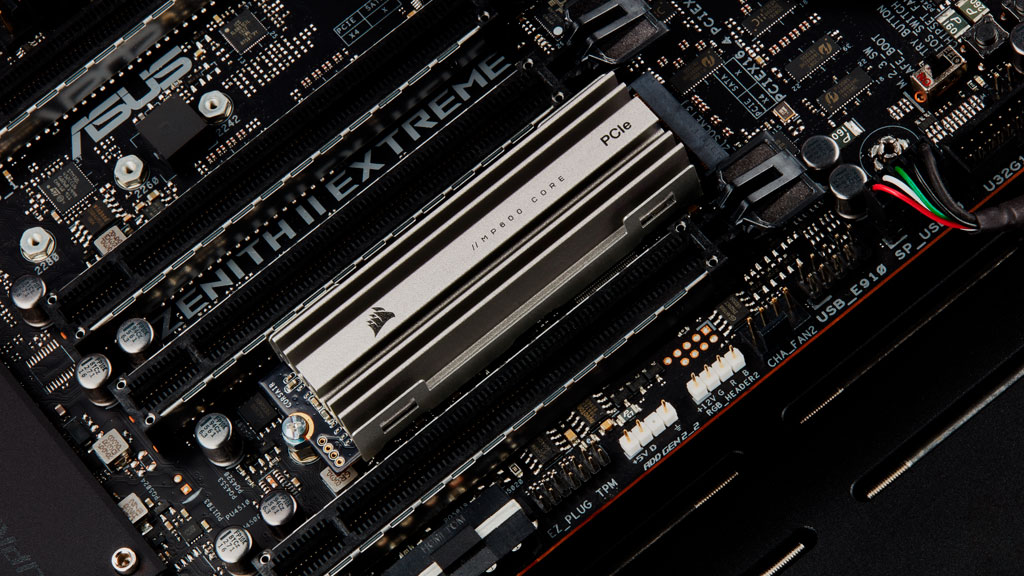Even faster SSDs based on PCIe 5.0 are expected to arrive next year
As more platforms supporting PCI Express 5.0 arrive, so will speedier SSDs.

It didn't take very long for storage makers to offer SSDs that nearly saturate the PCI Express 4.0 bus when plugged into a x4 slot (as all consumer NVMe drives do). There's still a smidgen of headroom left, but truly faster SSDs will arrive with the adoption of PCI Express 5.0. As such, expect to see PCIe 5.0 SSDs materialize in 2022.
More specifically, analysts at TrendForce anticipate next-gen SSDs to hit the ground running in the second or third quarter of next year. TrendForce is looking at things from the data center angle and is basing its prediction on the availability of new interfaces for servers, but as is typically the case, consumer products shouldn't be far behind.
"Intel and AMD are expected to kick off mass production of Eagle Stream and Genoa CPUs, respectively, in 1H22. In addition to being compatible with PCIe G5, these server processors will also support the CXL (Computer Express Link) interface," TrendForce states.
"TrendForce’s investigations indicate that NAND Flash suppliers have been fast-tracking their production of PCIe G5 SSDs in response to the upcoming mass production of Eagle Stream. As such, these SSDs are likely to see market release between 2Q22 and 3Q22," TrendForce adds.
The research firm doesn't discuss what this means for consumer SSDs, but I wouldn't be surprised if mainstream PCIe 5.0 SSDs arrived around the same time, or even earlier. Why? Intel is getting ready to release its first batch of Alder Lake CPUs this year, possibly in late October or November, and we already know Alder Lake will support PCIe 5.0 (as well as DDR5 memory).
This will manifest in Intel's upcoming 600 series chipset and the motherboards built around it. So support will be there on the consumer side in the very near future, we just need the PCIe 5.0 SSDs to follow.
Here's the thing—NVMe SSDs that leverage the PCIe 4.0 bus have access to around 8GB/s of potential bandwidth. Some drives are already very close to the maximum limit. PNY's XLR8 CS3140, for example, is rated to read data at 7.5GB/s, while Adata's XPG Gammix S70 is not far behind at 7.4GB/s.
Keep up to date with the most important stories and the best deals, as picked by the PC Gamer team.
That doesn't leave a whole lot of room for drives to tap into. As such, companies that make the controller hardware that help enable these blazing fast speeds are already looking ahead to PCIe 5.0. To that end, Marvell introduced its Bravera SC5 SSD controller two months ago, at the time saying it ranked as the industry's first to support PCIe 5.0 and NVMe 1.4b.

Best CPU for gaming: the top chips from Intel and AMD
Best graphics card: your perfect pixel-pusher awaits
Best SSD for gaming: get into the game ahead of the rest
"Bravera SC5 doubles the performance compared to PCIe 4.0 SSDs. This contributes to accelerated workloads and reduced latency, dramatically improving the user experience," Marvell said.
That specific controller, which is capable of a staggering 14GB/s, is intended for data center products. However, it shouldn't take a giant leap to port the core functionality over to the consumer side.
Meanwhile, Silicon Motion said it is planning to release PCIe 5.0 controllers next year, and of course, we can expect Phison to be on the ball as well. Several high-performance consumer SSDs tap Phison for its controller hardware, so it will be especially interesting to see what the company is able to deliver. Hopefully, we'll find out sooner rather than later.
Paul has been playing PC games and raking his knuckles on computer hardware since the Commodore 64. He does not have any tattoos, but thinks it would be cool to get one that reads LOAD"*",8,1. In his off time, he rides motorcycles and wrestles alligators (only one of those is true).


